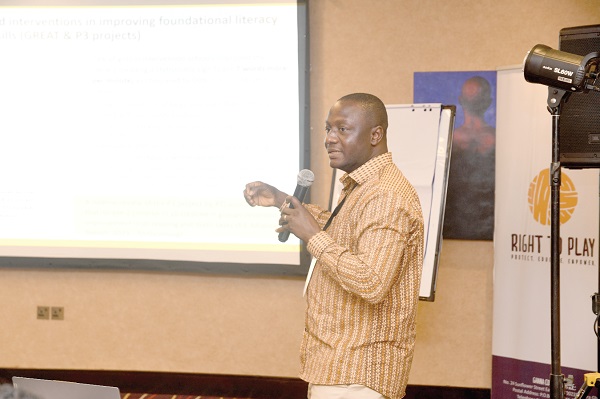
Play-based learning produces positive outcomes — Right to Play Ghana
Right to Play Ghana has stated that play-based learning contributes significantly to learning outcomes, literacy, attendance to school and building life skills of both boys and girls.
Citing studies conducted, the Senior Global Manager, Monitoring, Evaluation and Learning of Right to Play, Eric Opoku, said 73 per cent of girls in intervention schools (that is schools where play-based learning had been introduced) improved their literacy as compared to 60 per cent in non-intervention schools.
Advertisement
He said similar proportions of boys improved their literacy in projects and non-project schools.
Mr Opoku said this at a three-day bilateral learning exchange programme on quality education organised for Ghana and Sierra Leone by Right to Play Ghana.
The programme brought together experts on education from both countries, including their Ministers of Education, Dr Yaw Osei Adutwum of Ghana and Dr David Moinina Sengeh of Sierra Leone, to share ideas on integrating play-based learning to improve foundational skills and learning outcomes in schools.
As part of the programme, the participants visited the Mallam Cluster of Schools in the Greater Accra Region, which is one of the intervention schools Right to Play has introduced Play-based Learning.
Mr Opoku was making a presentation on evidence around play-based learning and its contribution to school performance and learning outcomes in Ghana and said in addition to academic skills, play-based interventions implemented appeared to have a positive impact on children’s socio-emotional learning skills.
Students confidence
He said students’ confidence also increased and added that students’ attendance improved over the project period from baseline to midline for both boys and girls.
“In all, 35.9 per cent of boys and 33.9 per cent of girls in intervention schools improved their attendance,” he said.
He pointed out that learning did not only happen in school but also within the home environment and, therefore, encouraged parents to assist their children at home with their studies.
In his presentation, the Director-General of the National Council for Curriculum and Assessment, Prof. Edward Appiah, confirmed that schools that had introduced play-based learning performed better than those without the intervention and explained that it could probably be because play-based learning made learning exciting and students did not have to struggle with learning under it.



